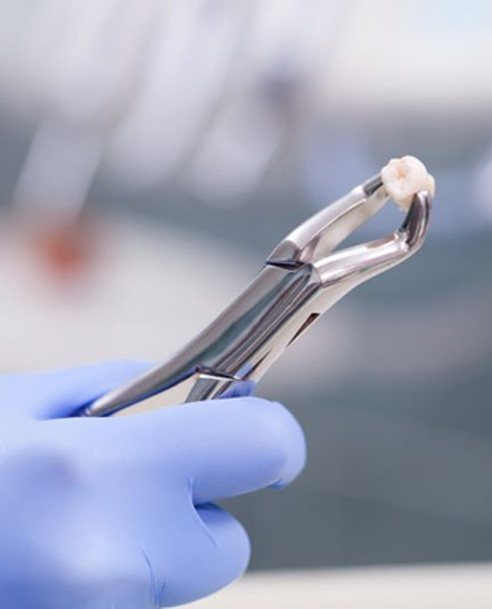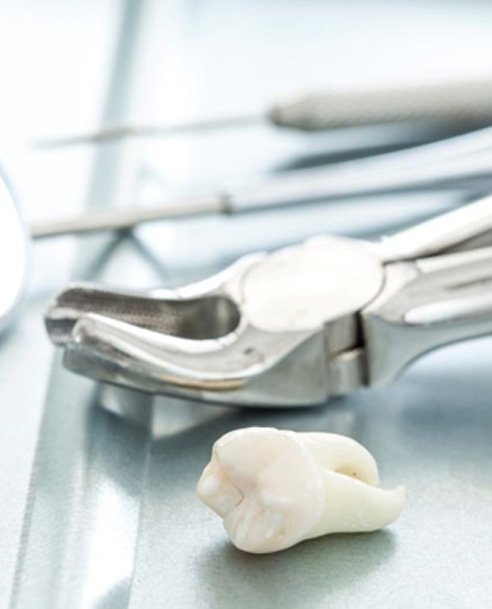Tooth Extractions – Albuquerque, NM
Pave the Way for a Healthier Smile

Dr. Keanna and our dental team favor a conservative approach to dentistry, so we always seek to help patients retain their natural teeth for as long as possible. In some circumstances, however, it becomes necessary to remove one or more teeth. If that is ever true for you, you can be confident that we will perform this emergency procedure as gently and precisely as possible. We want to help you pave the way for a healthier smile that will stand the test of time.
Why Choose Natural Dental Services Tooth Extractions?
- Gentle & Caring Dental Team
- Extractions Performed Only as a Last Resort
- Strong & Reliable Tooth Replacement Available
Reasons Why Tooth Extractions Are Necessary

It may become necessary to remove one or more teeth if:
- A tooth has suffered severe decay or damage that cannot be repaired via more conservative means.
- It is necessary to make room in the mouth for a denture or orthodontia.
- A tooth is infected, and we must remove it to stop the infection from spreading into nearby tissues.
- An impacted tooth is threatening the health of nearby dentition. (If a tooth is impacted, it simply means that it has not fully erupted from the gumline.)
- One of a child’s primary teeth has overstayed its welcome and is interfering with the development of incoming adult teeth.
The Process of Removing a Tooth

The process of removing a tooth is usually pretty straightforward. We start by numbing the patient’s mouth so they will feel little to nothing during the procedure. Then, we use an instrument called an elevator to lift the tooth out of its socket. We use forceps to grip the tooth and rock it back and forth, thereby breaking the connective tissues holding it place. To finish up, we clean out socket and use gauze to control any bleeding.
During your appointment, we may also talk to you about your options for replacing your lost tooth.
Tooth Extraction Aftercare

Here are some steps you can take to facilitate a smooth recovery after your extraction procedure:
- Take any medications as directed by our team.
- Get plenty of rest.
- Do not smoke.
- Do not spit vigorously.
- Prop your head up on pillows when you sleep.
- After the first 24 hours, regularly rinse your mouth with warm salt water.
- Consume soft foods, and try to keep food debris away from your extraction site.
You should also attend all recommended follow-up appointments with our team so we can replace your lost teeth in a timely manner. Unnecessarily postponing tooth replacement could lead to oral health complications down the road.
Tooth Extractions FAQs
Does Getting a Tooth Extracted Hurt?
Dr. Keanna and our team take patient comfort very seriously. During your extraction appointment, we will numb your mouth so you will not feel pain. However, you might experience some slight pressure as we are working to remove your tooth.
After the local anesthesia wears off, you can expect your mouth to feel sore for anywhere from a few days to a week or longer. During that time, you can minimize your discomfort by carefully following the post-op instructions provided by our team. For example, you should eat a soft diet, get plenty of rest, and make sure your mouth stays clean.
Is There an Alternative to a Tooth Extraction?
Whenever possible, our team favors the most conservative solution to our patients’ dental problems. That is why Dr. Keanna always carefully considers other treatment options before recommending an extraction.
What Are My Options for Replacing a Missing Tooth?
After you get one or more teeth removed, there are a few different possible ways to recomplete your smile:
- Dental implants replace the roots of lost teeth. They can support crowns, bridges, and dentures. They preserve the jawbone and are the next best thing to natural teeth.
- A fixed dental bridge uses the remaining natural teeth for support. It consists of two crowns, which get attached to the teeth next to the empty space (the abutment teeth). One or more artificial teeth span the gap.
- Dentures are removable prosthetics that are usually recommended for people with extensive tooth loss. They can look extremely natural and restore a degree of chewing power.
Dr. Keanna will recommend the form of tooth replacement that he believes is the best fit for your unique situation.
Can I Leave the Space Empty After a Tooth Extraction?
After the removal of wisdom teeth or supernumerary (extra) teeth, it is fine not to pursue tooth replacement. In almost all other instances, though, you should invest in a bridge, denture, or dental implant. Failing to replace lost teeth could increase your risk of further tooth loss and other oral health issues. For example, your remaining teeth could drift out of place, causing you to have a misaligned bite. You may also start to feel self-conscious about the appearance of your smile.
